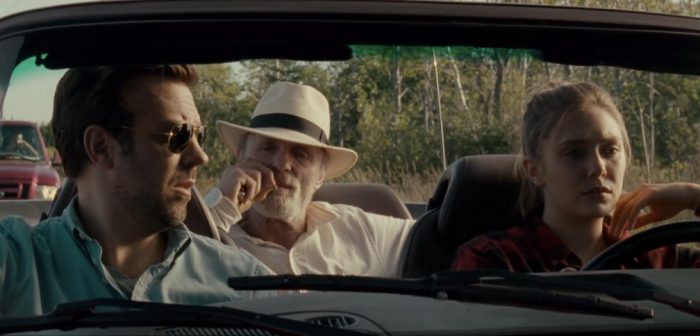
Kodachrome follows a record executive named Matt (Jason Sudeikis) who accompanies his terminally ill, estranged, famous photographer father Ben (Ed Harris) and his father’s nurse Zoe (Elizabeth Olsen) on a road trip to develop his father’s old analog film before processing said film is no longer possible. Matt must reconcile with his dying father in order to emerge from his own current morass of failure. Dennis Haysbert also has a small role as the father’s financial manager Larry, lest the movie be accused of being too white.
Picking apart the technical aspects of this film is difficult, which brings me to my first issue with the movie. What note can I make of the cinematography as seen on my 42″ TV? How can I evaluate sound design when I only have three speakers instead of a movie theater’s full complement? Movies are meant to be seen in theaters. What I can comment on is the editing which is fully lousy, frequently relying on cutting back and forth to close up shots of people sitting in cars thinking about things. This movie eschews much of the standard cinematography of the open road in favor of people talking in a convertible where all the conversation can be heard from the back seat even though they’re in a convertible. Further disobeying the laws of physics, Ed Harris maintains his fedora driving around in an unroofed car for the movie’s entirety.
Matt’s attempted reconciliation with his dying father serves as the movie’s central theme. We watch it all unfold as Ben makes a great effort to get to know his son and acknowledge his failings as a father, so they can renew their relationship as adults. Just kidding, that never happens. And thus, begins my second, and most frustrating, issue with Kodachrome; this movie understands nothing about estrangement. Nurse Zoe’s torturous speech about how Matt is afraid to open himself up to his father displays her willful ignorance regarding Ben’s incapability of loving his son. Zoe serves as the stand-in for every single person who has ever told someone to reconcile with an estranged parent because family is more important than any individual person’s mental health. The movie fails to acknowledge that not speaking to his father for ten years is Matt’s way of reconciling his past; by not continuing to seek out a loving relationship he will never have. I wish it were a spoiler to say that the photos on the film that get developed are shots of Matt when he was young, but about five seconds into the movie, any intelligent viewer will have figured that out. The movie’s climax involves an emotional Matt realizing that his father really did love him… except, no, keeping baby pictures doesn’t mean that all. What it means, and curiously Kodachrome understands this well, is that narcissistic parents can only love young children as reflections of themselves. The moment children become their own person, narcissists no longer hold any interest toward said children. “I loved you as a baby” is not actually an apology for being a terrible father for the remainder of a child’s life.
The important part of the movie is that Matt learns about himself during this road trip and recognizes all the ways that he’s self-sabotaging his career and romantic life so that he can embrace the future as a new man. Just kidding, that never happens either. Matt learns nothing and undergoes no real changes as a person at all. His entire voyage of self-discovery is the opportunity to bang a younger woman and inherit enough wealth so that his career problems no longer exist. Of course, this was written by Jonathon Tropper, an author who has made a career out of wish fulfillment for males that involves them becoming successful without having to work hard or become a decent person. So, a man who is terrible in his career field never has to figure out how to get better at it, and a father who abandoned his child never has to apologize, but everyone gets the love and adoration they don’t deserve because hey, they’re men, and that’s the reward for being male. That all three main actors can do nothing with the terrible source material is not a surprise. That no one stopped Netflix from making this movie is a shame.
Image: Netflix

